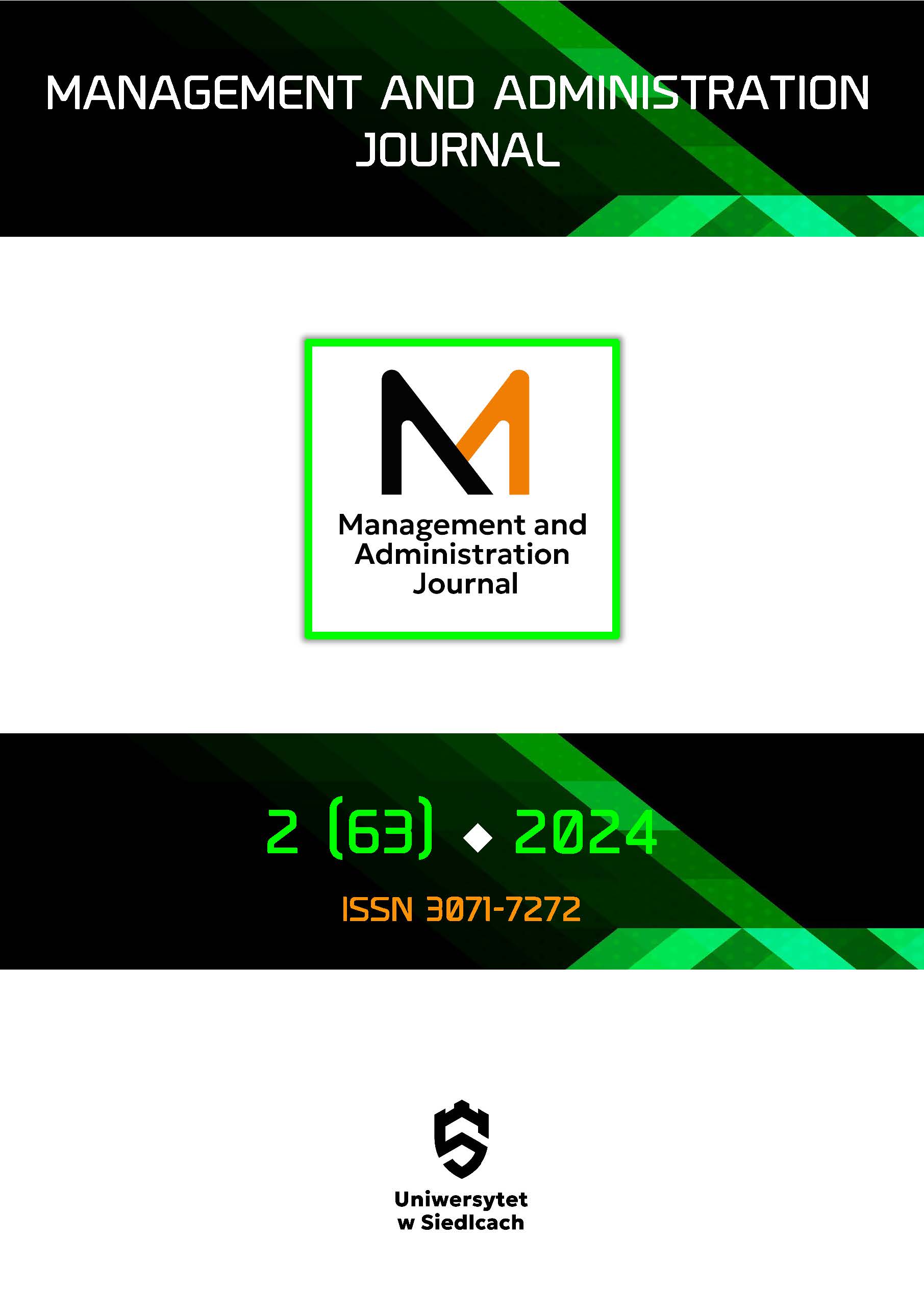STAGNACJA ZAWODOWA A SATYSFAKCJA Z PRACY. MODERUJĄCA ROLA PRACY ZDALNEJ
DOI:
https://doi.org/10.34739/maj.2024.02.11Słowa kluczowe:
stagnacja zawodowa, satysfakcja z pracy, praca zdalnaAbstrakt
Badanie analizuje wpływ stagnacji zawodowej na satysfakcję z pracy, uwzględniając moderującą rolę pracy zdalnej. Stagnacja zawodowa, charakteryzująca się ograniczonymi możliwościami rozwoju zawodowego, została zidentyfikowana jako istotny czynnik obniżający zaangażowanie i satysfakcję pracowników. W kontekście elastyczności i autonomii, praca zdalna stanowi potencjalne narzędzie łagodzenia negatywnych skutków stagnacji zawodowej. Wykorzystując metodologię ilościową, badanie przeanalizowało dane od pracowników sektora publicznego i prywatnego w Gruzji, stosując regresję liniową do testowania hipotez. Wyniki potwierdzają negatywną korelację między stagnacją zawodową a satysfakcją z pracy oraz wskazują, że większa autonomia w pracy zdalnej znacząco zwiększa poziom zadowolenia zawodowego. Badanie podkreśla potrzebę wdrażania strategii projektowania pracy, które uwzględniają elastyczne formy zatrudnienia, jako środek przeciwdziałania skutkom stagnacji zawodowej i wspierania dobrostanu pracowników.
Pobrania
Bibliografia
Abele, A. E., Volmer, J., , Spurk, D. (2012). Career stagnation: Underlying dilemmas and solutions in contemporary work environments. In Work and Quality of Life: Ethical Practices in Organizations (pp. 107–132). Springer Netherlands. https://doi.org/10.1007/978-94-007-4059-4_7
Abdullah, N. G., Mercan, M., , Matin, A. (2022). Impact of Empowerment Types on Service Quality: A Case Study among SMEs. Journal of Business, 11(1), 7–23. https://doi.org/10.31578/job.v11i1.197
Appelbaum H, S. (1997). Career development in the plateaued organization.
Arian, M.,Khoshtaria, T., Mercan, M., Asashvili, L.(2024). The effect of consumption experience on self-perception, willingness to pay, and purchase intention toward green products among Generation Z. International Journal of Green Economics (IJGE), Vol. 18, No. 3, 2024. DOI: 10.1504/IJGE.2024.141406
Aslantas, M. (2024). The Effect of Talent Management Strategies on Work Engagement in the Finance Sector: A Study on Bank Employees. DergiPark (Istanbul University). https://dergipark.org.tr/tr/pub/asead/issue/84469/1466859
Aslantas, M. (2024). Comparative Analysis of Employees’ Work Engagement Behavior With Turnover Intention. Journal of Global Social Sciences, 5(17), 1–18. https://doi.org/10.58934/jgss.v5i17.241
Bond, F. W., , Bunce, D. (2000). Mediators of Change in Emotion-Focused and Problem-Focused Worksite Stress Management Interventions. Journal of Occupational Health Psychology, 20(10), 156–163. https://doi.org/10.1037/1076-8Q98
Brough, P., Timms, C., O’Driscoll, M. P., Kalliath, T., Siu, O. L., Sit, C., , Lo, D. (2014). Work–life balance: A longitudinal evaluation of a new measure across Australia and New Zealand workers. International Journal of Human Resource Management, 25(19), 2724–2744. https://doi.org/10.1080/09585192.2014.899262
Chao. (1990). Exploration of the Conceptualization and Measurement of Career Plateau: A Comparative Analysis. Journal of Management, 16.
Cropanzano, R., , Mitchell, M. S. (2005). Social exchange theory: An Interdisciplinary review. In Journal of Management (Vol. 31, Issue 6, pp. 874–900). https://doi.org/10.1177/0149206305279602
Devi, S. A. R., , Basariya, R. S. (2017). Career Plateau of Employees and its Causes. International Journal of Advanced Research in Science, Engineering and Technology, 4(3), 3589–3592.
Ference, T. P., Stoner, J. A., , Kirby Warren, E. (1977). Managing the Career Plateau. In Source: The Academy of Management Review (Vol. 2, Issue 4).
Godshalk, V. M., , Fender, C. M. (2015). External and Internal Reasons for Career Plateauing: Relationships With Work Outcomes. Group and Organization Management, 40(4), 529–559. https://doi.org/10.1177/1059601114558062
Hackman, J. R., , Lawler Iii, E. E. (1971). EMPLOYEE REACTIONS TO JOB CHARACTERISTICS. In JOURNAL OF APPLIED PSYCHOLOGY MONOGRAPH (Vol. 55, Issue 3).
Hu, C., Zhang, S., Chen, Y. Y., , Griggs, T. L. (2022). A meta-analytic study of subjective career plateaus. Journal of Vocational Behavior, 132. https://doi.org/10.1016/j.jvb.2021.103649
Lapalme, M. È., Tremblay, M., , Simard, G. (2009). The relationship between career plateauing, employee commitment and psychological distress: The role of organizational and supervisor support. International Journal of Human Resource Management, 20(5), 1132–1145. https://doi.org/10.1080/09585190902850323
Lentz, E., , Allen, T. D. (2009). The role of mentoring others in the career plateauing phenomenon. Group and Organization Management, 34(3), 358–384. https://doi.org/10.1177/1059601109334027
Khoshtaria, T., Arian, M., Mercan, M., Datuashvili, D. (2021). The impact of customers' purchasing patterns on their showrooming and webrooming behaviour: an empirical evidence from the Georgian retail sector. International Journal of Electronic Marketing and Retailing, 2021 Vol.12 No.4, pp.394 – 413
DOI: 10.1504/IJEMR.2021.118305
Mercan, M., Khoshatria, T., Matin, A., , Sayfullin, S. (2020). The Impact of e-services Quality on Consumer Satisfaction: Empirical Study of Georgian HEI. Journal of Business, 9(2), 15–27. https://doi.org/10.31578/.v9i2.175
Nachbagauer, A. G. M., , Riedl, G. (2002). Effects of concepts of career plateaus on performance, work satisfaction and commitment. International Journal of Manpower, 23(8), 716–733. https://doi.org/10.1108/01437720210453920
Oldham, G. R., Hackman, J. R., , Pearce, J. L. (1976). Conditions under which employees respond positively to enriched work. Journal of Applied Psychology, 61(4), 395–403. https://doi.org/10.1037/0021-9010.61.4.395
Rotondo, D. M., , Perrewé, P. L. (2000). Coping with a career plateau: An empirical examination of what works and what doesn’t. Journal of Applied Social Psychology, 30(12), 2622–2646. https://doi.org/10.1111/j.1559-1816.2000.tb02453.x
Rousseau, D. M., Hansen, S. D., , Tomprou, M. (2018). A dynamic phase model of psychological contract processes. Journal of Organizational Behavior, 39(9), 1081–1098. https://doi.org/10.1002/job.2284
R.S.Lazarus S. Folkman. (1984). STRESS, APPRAISAL, AND COPING.
Schall, M. A. (2019). The Relationship Between Remote Work and Job Satisfaction [San Jose State University]. https://doi.org/10.31979/etd.2x82-58pg
Singh, D. (2019). A Literature Review on Employee Retention with Focus on Recent Trends. International Journal of Scientific Research in Science, Engineering and Technology, 425–431. https://doi.org/10.32628/ijsrst195463
Tremblay, M., Dahan, J., , Gianecchini, M. (2014). The mediating influence of career success in relationship between career mobility criteria, career anchors and satisfaction with organization. Personnel Review, 43(6), 818–844. https://doi.org/10.1108/PR-08-2012-0138
Yi-chun Lin (2020) n Academy of Management Proceedings; DOI: 10.5465/AMBPP.2020.20787
Yang, W. N., Niven, K., , Johnson, S. (2019). Career plateau: A review of 40 years of research. In Journal of Vocational Behavior (Vol. 110, pp. 286–302). Academic Press Inc. https://doi.org/10.1016/j.jvb.2018.11.005
Pobrania
Opublikowane
Numer
Dział
Licencja
Prawa autorskie (c) 2024 Management and Administration Journal

Utwór dostępny jest na licencji Creative Commons Uznanie autorstwa – Użycie niekomercyjne 4.0 Międzynarodowe.





